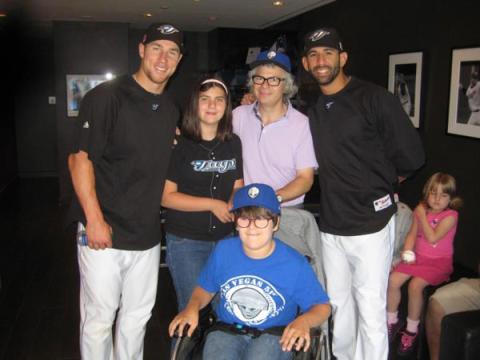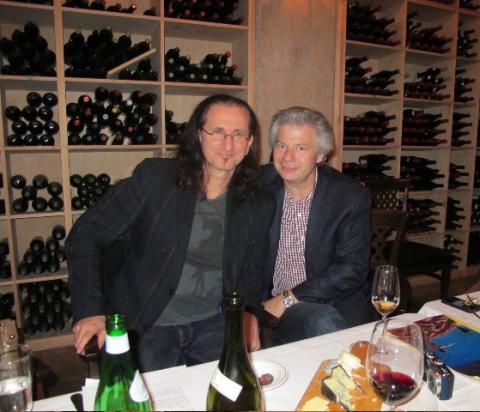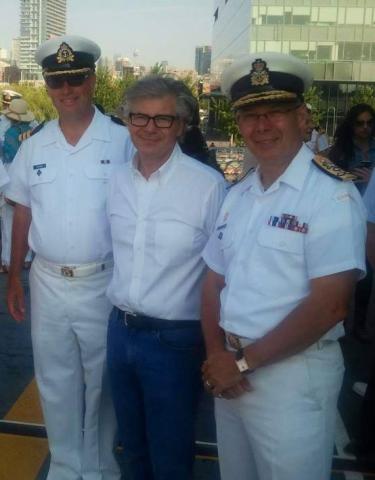
It’s not just the amount of money Barberian routinely disperses but the breadth of his giving that’s truly staggering. Call him an equal opportunity altruist, one that fields appeals for support not from a position on a board or at a foundation but personally, on his mobile, which hums constantly.
The list of Barberian’s benefactors seems endless: the Make-a-Wish Foundation, MukiBaum Treatment Centres, Upper Canada College, Childhood Cancer Canada Foundation, the Holland Bloorview Kids Rehabilitation Hospital, the Cornerstone 52 Foundation (which in turn benefits Sick Kids Foundation, Ronald McDonald House Charities, Kids Help Phone and Camp Oochigeas), to name a few.
Whether he’s providing straight-up cash, gift-in-kind donations (ie: free dinners at the steak house bearing his surname that charities can auction or disperse) or simply serving as a “connector” between various organizations and the myriad celebrities he has on speed dial, Barberian is a consummate giver, not to mention a well-placed member of Toronto society. (Wife Linda Rodeck is the managing director of Sotheby’s auction house).
Indeed, the 48-year-old restaurateur — whose legendary wine collection is valued into the millions —donates pretty much his entire annual income to charity. He gives so much, he tells Samaritanmag, that Canada Revenue Agency allows him to “carry forward” or fan his massive tax receipts across multiple years.
“I give more than I am legally allowed to give,” he cracks. “I have a hard time saying no.
“In total there are probably 10 charities I support at a substantial level — meaning minimum donations of $5,000 a year or more in cash — and probably another 25 at some level. So yes, there’s private donations and gift-in-kind donations.
“I give whatever will make the charity the most amount of money. Sometimes cash is best. But if I can multiply something — say, like offering a dinner in the restaurant’s wine cellar like the two I gave last year with Geddy Lee [benefiting the Rush singer’s Grapes for Humanity program] — then something that starts out being worth $4,000 or $5,000 ends up worth $15,000.”

“Children matter. And sometimes they find themselves in these situations through no fault of their own,” says Barberian. “We are a very lucky family; I do very well in business. But there are many people who just can’t afford things we can.
“Our son has every advantage because of us. But when we go to these places serving disabled kids and I see those not as privileged as us, I want to help.”
Barberian’s impact simply can’t be overstated. In interview after interview with Samaritanmag, those who’ve worked with him — including various CEOs, donor relations managers and the like — rave about his generosity, accessibility and his willingness to think outside the proverbial box when it comes to raising cash.
“He’s a lovely human being. He has a huge heart and when it comes to children there is nothing he won’t do,” offers Jennifer Klotz-Ritter, chief executive officer with Make-A-Wish Foundation of Canada. “Our organization has a simple, but very powerful mission. And he gets it.”
That’s a sentiment echoed repeatedly.
“We are just so grateful, not just for his generosity and creativity but for the person he is,” says Ashley Grant deMercado, manager, fundraising & corporate relations with the MukiBaum Foundation, which operates the MukiBaum Centres assisting profoundly disabled people. “He makes me love what I do more because he makes it worth it.”
Grant deMercado recalls Barberian’s work in action. “A few years back I called and said, ‘I am so excited you’re coming to the golf tournament, but how can we add a wow factor during our live auction?’ Arron came back with, ‘Chad Kroeger from Nickelback is a friend. How about I get him to donate an autographed guitar? And I’ll buy concert tickets and we’ll put a package together.’ And that raised a ton of money. So that’s Arron the individual using his personal connections to help us.
“Then there is the restaurant. He has given us hundreds of gift certificates totaling tens of thousands of dollars over the last six years, easily $30,000 worth of gift-in-kind donations, which means things like gift certificates and products that we use to raise money.
“He gives us vintage wines. He donates corporate boxes for Blue Jays games. And he’s always willing to speak to us about doing private events at his restaurant. I mean, it’s unreal. Last July, he gave us golf balls [that] people could bring into Barberian’s Steak House for a free drink. Stuff like that brings such added value to our donors and sponsors.”
And it’s not only charities benefiting from Barberian’s largesse. Sometimes those who just happen to be in his orbit enjoy his prosperity as well.

Barberian, one of many prominent guests aboard the ship during one such reception through his connection to Vice Admiral Paul Maddison — a frequent guest at Barberian’s Steak House — felt “weird being served canapés by men and women hired to serve our nation as our ambassadors.”
So on the spot, he offered free dinners at his restaurant to the crew while the ship — currently on a 10-week Great Lakes deployment — was in town. “And I can tell you that was a highlight of that visit for anyone who went there,” Cdr. Thornton offers.
“That is not something my crew would normally be able to do; it’s a very nice restaurant. But his gracious offer was taken up by probably more than 100 members of my crew.” (Barberian reckons it was closer to 160 at a cost of between $15,000 and $20,000).
“The hospitality of his servers, the food, he showed us his amazing wine collection — it was incredible. A gesture like that is pretty rare. I’ve been in the Navy 23 years and never seen anything like that. And to me, it wasn’t about the cost so much as his making my guys feel special.”
Typically, Barberian is already brainstorming additional ways of giving back in future. “Next year I hope to organize all the retailers and restaurateurs I know to offer cards with giveaways to the sailors when they’re in town,” he says. “So we’ve taken the seed and made it grow.”
Still, one wonders just how good business is that Barberian — who is also one of the key masterminds behind the launch of Yonge-Dundas Square — is able to offer so many dinners for free, especially since the average main at the steak house clocks in around $45.
“I can advertise my business in multiple ways, and my method for advertising is using charity,” he says. “Instead of just giving it to Google or to a newspaper, I give money to charity. So it’s partly marketing because I believe word-of-mouth is very powerful for advertising.
“Giving out gift certificates encourages people to come into the restaurant. They’ll come and experience what we do and have been doing for 53 years and they’ll be back. We do well and have done well by the city of Toronto for a long time, so it’s about giving it back.”
Next up on Barberian’s charitable bucket list: working with former Blue Jays catcher Gregg Zaun to bring a Little League program for disabled kids to Toronto. “We have Little League but not one for kids with disabilities. I am going to go right up the ladder and I want a million bucks in the bank to do this right.”
Is there anyone Barberian says no to? He laughs. “I haven’t necessarily turned a charity down, but I might have turned down their fourth request for something.
“An organization might come to me for help with their golf tournament or their gala — fine — but then they just start asking for too many things along the way. That’s when I have to say, ‘Look I kind of want to spread things out.’
“I have thought of launching a proper foundation, so charities can address that and the foundation could make decisions four times a year. Right now, so many decisions are made on the fly and probably could be made better.
“But you know, anyone can get involved. All these charities need help – volunteer help. And at the end of the day everybody can make a difference. Whether it’s donating clothes to a program like Dress Your Best or donating your time to help out at Bloorview or MukiBaum, you have to give.”
girls youth nike high tops shoes Light Smoke Grey